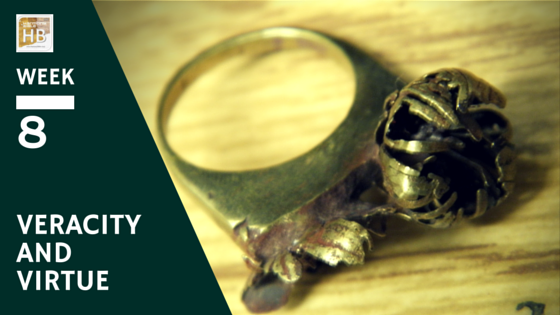Week 8 | Section 9
 Joseph (like Zechariah) was a righteous man, and he too had a wife who was blessed with a child, Jesus the Son of God. Perhaps we all know the details of this story but many choose to question the veracity of Mary’s virginity. Like Joseph, some logically think, there must be another man involved. However, if we believe that his paternal father was of human decent, it changes the Gospel forever and denies the testimony of the Apostle John who wrote, “…the Word was God. He was with God in the beginning.” Friends, we hope that you too can accept these words today for in them, by the grace of God, lie the keys of freedom for all humanity.
Joseph (like Zechariah) was a righteous man, and he too had a wife who was blessed with a child, Jesus the Son of God. Perhaps we all know the details of this story but many choose to question the veracity of Mary’s virginity. Like Joseph, some logically think, there must be another man involved. However, if we believe that his paternal father was of human decent, it changes the Gospel forever and denies the testimony of the Apostle John who wrote, “…the Word was God. He was with God in the beginning.” Friends, we hope that you too can accept these words today for in them, by the grace of God, lie the keys of freedom for all humanity.
Scripture:
Matthew 1:18-25
18 Now1 the birth of Jesus Christ2 was like this: After his mother, Mary, was engaged3 to Joseph, before they came together, she was found pregnant4 by the Holy Spirit.5¯6 19 Joseph, her husband,7 being a righteous man, and not willing to make her a public example, intended to put her away secretly.8 20 But when he thought about these things, behold, an angel of the Lord9 appeared to him in a dream,10 saying, “Joseph, son of David, don’t be afraid11 to take to yourself Mary, your wife, for that which is conceived in her is of the Holy Spirit.12 21 She shall give birth to a son. You shall call his name Jesus,13 for it is he who shall save his people14 from their sins.” 22 Now all this has happened, that it might be fulfilled15¯16¯17 which was spoken by the Lord through the prophet, saying, 23 “Behold, the virgin shall be with child, and shall give birth to a son.18 They shall call his name Immanuel;” which is, being interpreted, “God with us.”19 24 Joseph arose from his sleep, and did as the angel of the Lord commanded him,20 and took his wife to himself; 25 and didn’t know her sexually until she had given birth to her firstborn son. He named him Jesus.21
Group Dialog:
- What rights ad responsibilities were given and expected of you and your siblings?
- What questions remain for you when considering Jesus’ birth, his divine nature and purpose?
- Open the Scriptures and a dialog about the nature of sin, and the need for redemption, and reconciliation and the role of the Savior.
- What characteristics and behaviors of Joseph do you find most compelling?
- If you’ve had divine inspiration or exhortation in a dream, would you share the experience and forth coming lessons with the group?
Learning Objectives:
reasoning, righteous decision making process, openness to the Holy Spirit, Divinity of Jesus, Salvation from sins, God with us.
Study Notes:
- Remember that Mary has been visiting and attending to Elizabeth for the last three months
- Matthew wrote this Gospel about 50 years after the resurrection, perhaps from Antioch, just after the reign of Nero. As we discussed in week 3, Matthew begins his record by giving a clear account of the genealogy of Jesus, which affirms the covenant and faithfulness of God as well as the priestly authority of such an heir – the one called the Christ, the Messiah.
- See notes on betrothal in week 5
- Some consider the doctrine of the virgin birth to be trivial, a less important doctrine than others. However, if one asserts that Jesus was not born of a virgin as attested to repeatedly in the scriptures, then he had had a human father (for he was born and did not simply appear as Melchizedek) then they have undermined the nature of Christ and his ability to redeem and reconcile the world to himself (God). Jesus received his humanity from Mary (Heb 4:15), yet his eternal existence and activity was from before time (John 1:14; 1Tim 3:16; Heb 2:14-17, 7:6). The reality of his eternal nature and the virgin birth is what circumvented the transmission of the Adamic nature, and in such he had the authority power and purpose to defeat the devil’s hold on humanity (Gen 3:15; 1Cor 1:45-49; 1Pet 3:18; Rom 5:10). See also the I am’s of Christ.
- This is an essential aspect of the doctrine of the divinity of Christ. The doctrine is a essential aspect to the Christian message and is part of the set of doctrines which sets Christianity apart from other world religions. See Week 5, Luke 1:31
- Every disciple should learn to accept this truth (in phase 1) for if Jesus’ father was of earthly decent, then Jesus can be nothing more than an enlightened Rabbi, prophet or ascended human being. None of which have the power to save, redeem, or reconcile. But Jesus is the Son of God (vs 23) able to save (Mat 1:23, Isa 9:6-7). His humanity allowed for a blood sacrifice to atone for human sin, his sinless life allowed him to be the “spotless lamb”, and his eternal nature allowed the one sacrifice to be sufficient and effective from everlasting to everlasting. (Heb 9:22; Eph 1:7, 2:13; 1Pet 1:18-19; Rom 3:9-20; Eccl 7:20; Rev 1:5)
- That is her betrothed husband (see earlier note)
- Though he was just a man (a sinner , as was Mary, and both in need of a Savior) Joseph wa a righteous man who knew the law (Dt 22:23,24) which instructed him to bring Mary to the magistrate who would have had the imprudent woman taken outside the city gate to be stoned as an example to deter others from fornication. Perhaps because of his love for her, perhaps out of his understanding of mercy (Mic 6:8) or his godly virtue, he decided on a different path – to divorce her quietly. This shows us a bit of his character, being merciful, patient, humble, and courageous. Since we will read very little more about Joseph it will be good to give this some thought.
- The Angel gives Joseph the same message as Mary
- The same humility and righteous character that allowed him to act with mercy, was also that which allows Joseph to receive divine counsel even while sleeping.
- fear not – reproach from scandalous rumors that would certainly follow
- Hagios (pnuema) Neither Joseph nor any other man was the father of Jesus. Once again The Gospeler makes clear the doctrine of the trinity, the immaculate conception and divinity of Jesus.
- Jesus is the Greek form of Joshua, which means “the LORD saves” and may be interpreted as “savior” (Acts 13:23).
- From the heritage we discussed in week 3, this applies to the Hebrew people and the world. More clearly as shown in vs 22,23 the affect of salvation will be those who are his children, heirs, those who have faith in him, who believe/trust/rely on his being and work to redeem and reconcile, and are thus born again. Read 1Jn 2:23; 1Pet 1:2; Rom 10:9.
- That is this fulfilled what was written in Isa. 7:14. Because of the eternal nature of Jesus, this would not be a temporary salvation like that provided by Gideon. He took a long while to take God at his word but then led the Jewish people to one of their greatest military victories freeing them from oppression. (See: Judges 2:1-3, 5:31, 6:1-10, 8:22; Ezk 36:22). No, this salvation would be an everlasting salvation only possible by the Lord, the Messiah .
- Matthew uses this form of rhetoric (metalepsis) over a dozen times as a means to weave together the tapestry of the Old Testament story and cause his intended Jewish readers to dig deeper into their memories and heritage to see that Jesus (now dead, risen and ascended) is the long awaited Messiah.
- Unfortunately too many disciples today search for a quick answer to their questions and do not search out the scriptures and therefore do not understand the full power of the Good News. This is part of our strategy. Wile we our course of study originates from he chronological Harmony of the Gospels, our study often goes back to the Old Testament and forward to the Epistles, letters, and Revelation all the rigor and mercy to give the Good News the freedom to work in us.
- Jesus was the first-born son of Mary according to Jewish law the promogeniture (bekhor, Ex 13:2,12,15; Num 8:16). Read also Ex 4:22; Jer 31:8,9; Mic 5:2; Gen 21:33; Ps 41:13, 90:2, 103:17; Isa 40:28.
- Read: Isa 7:14; John 1:1-3; Mt 28:18-20; Col 1:15,16; Heb 1:2.
- Joseph, humble in character, surely wrought by his study of his people history and knowledge of the Scriptures, allowed him to accept and act on the message from the Angel. He re-aligned his thinking, re-purposed the merciful motive and took Mary to be his wife.
- All we know about Joseph in Scripture is taken from these passages (Mt 1:16,18,19,20,24; 2:13,19; John 1:45, 6:42; Luke 1:27,2:4,16,33,43, 3:23, 4:22, and Mark doesn’t even mention Joseph). We read of is presence leaving the temple when Jesus was 12, but there is no mention of his name or presence at the wedding in Cana (when Jesus was about 30) nor any time afterwards. Because Jesus instructs John to receive his mother while they both stood weeping at the foot of the cross, it is understood that Joseph had died sometime before but thee are no validated sources to identify when he died.
